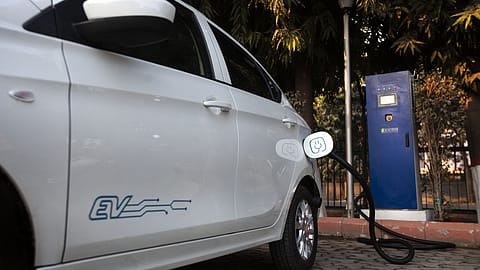India needs to invest $19-33 bn annually for EV charging Infra: IEA
The sale of electric vehicles in India is projected to reach nearly 35% of total vehicle sales in 2030.

India's average annual investments in electric vehicles (EVs) and private chargers will need to increase from about $210 million in 2016-2020 to $19-33 billion in 2026-2030, to enable the goal of EVs accounting for 35% of total vehicle sales by 2030 and thereby achieve carbon emission goals, estimates the International Energy Agency (IEA).
The sale of electric vehicles (EV) in India, the world’s fourth largest car manufacturer in the world, is projected to reach nearly 35% of total vehicle sales in 2030. It will avoid 5 million tonnes (Mt) CO2, while in 2050, the amount could range from 110 to 380 Mt CO2, depending on the EV fleet size and the pace of power sector decarbonisation, says IEA's analysis 'Transitioning India’s Road Transport Sector'.
India’s current EV market is small but growing as EVs accounted for 1.8% of new vehicle sales in 2021 and more than 4% in 2022. Shares vary from more than 50% among three-wheelers, to 4% for two-wheelers and less than 1% for cars, reflecting differences in purchase and operating costs. Analysis of the total cost of ownership (TCO) shows that electric three-wheelers are 70% cheaper than their gasoline-powered ICE equivalents over their lifetime. Policy measures such as low-emission zones, stringent fuel economy standards or zero-emission vehicle (ZEV) requirements can further accelerate EV deployment, suggests IEA.
Observing that the road transport presently accounts for 12% of India’s energy-related CO2 emissions and is a key contributor to urban air pollution, the report says as India seeks to meet the increasing demand for private mobility and the transport of goods, energy use and CO2 emissions from road transport could double by 2050. Ambitious policies could help reduce energy demand by 30% in 2050 relative to current policies, saving India 70 Mt of oil equivalent (80% of the sector’s current energy needs). CO2 emissions will peak in the mid-2030s and fall to about 20% below today’s level by 2050. Cumulatively, this could avoid up to 4 (gigatonne) Gt CO2 between 2021 and 2050. Up to 2030, additional reductions are realised equally through stronger energy efficiency improvements in vehicles with an internal combustion engine (ICE), accelerated EV uptake and higher biofuel use. After that, electrification, especially of cars and trucks, accounts for most of the additional abatement potential, says the report.
The IEA observes that two flagship national programmes support road transport electrification in India, The Faster Adoption and Manufacturing of Electric Vehicles (FAME) scheme which provides purchase incentives and charging infrastructure support and the Production-Linked Incentive (PLI) schemes that provide incentives for manufacturing in different sectors.
Developing strategies for clean trucking should be a priority and fuel efficiency improvements are critical in reaching the goals. India implemented the Corporate Average Fuel Consumption (CAFE) standards for passenger cars in 2017 and in 2022, these standards were tightened by more than 10% to 113 g CO2/km, which can help the fuel efficiency of cars improve by less than 20% up to 2035. If India were to achieve a 55% reduction in corporate average fuel economy by 2035 compared to current levels, cars sold between 2035 and 2037 could save up to 145 Mtoe in fuel consumption and avoid 400 Mt CO2 emissions over their lifetime. The government is revising fuel economy standards for trucks and is expected to release a roadmap by the end of 2023. To be on track with the 2070 goals, the fuel efficiency of the diesel truck fleet needs to improve by more than 35% by 2050. Electric and fuel cell trucks (ZEV) will make inroads into the fleet only after 2030, policy efforts to reduce costs and build enabling infrastructure need to begin now for leveraging scale in the next decades, says IEA.